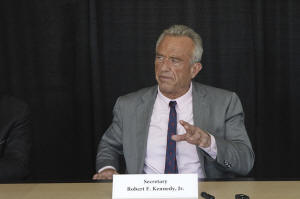RFK Jr.'s vow to overhaul vaccine injury program echoes grievances of
anti-vaccine movement
[August 08, 2025]
By MATTHEW PERRONE
WASHINGTON (AP) — Health Secretary Robert F. Kennedy Jr. is vowing to
“fix” the federal program for compensating Americans injured by
vaccines, opening the door to sweeping changes for a system long
targeted by anti-vaccine activists.
Health experts and lawyers say updates are needed to help clear a
backlog of cases in the Vaccine Injury Compensation Program, created by
Congress in 1986 as a no-fault payment system for presumed vaccine
injuries.
But they also worry Kennedy’s changes will reflect his history as a
leader in the anti-vaccine movement, which has alternately called for
abolishing the program or expanding it to cover unproven injuries and
illnesses that aren't connected to vaccines.
Kennedy and other critics believe the program is “too miserly in what it
considers to be a vaccine injury,” said Jason Schwartz, a public health
expert at Yale University. “That’s created great concern that he could
expand what’s included.”
Anti-vaccine groups have long suggested a link between vaccines and
autism, despite scientific consensus that childhood vaccines don’t cause
the condition. Adding autism to the list of injuries covered by the plan
“would dramatically increase the number of compensable cases,
potentially bankrupting it," Schwartz said.
Program is credited with saving the U.S. vaccine industry
Signed into law under President Ronald Reagan, the compensation program
is designed to provide quick, efficient compensation to Americans who
report known injuries associated with vaccines, such as rare allergic
reactions. At the time of its creation, a number of vaccine-makers were
exiting the business due to risks of class action lawsuits.

In a recent social media post, Kennedy called the program “broken” and
accused federal lawyers and adjudicators who run it of “inefficiency,
favoritism and outright corruption.”
Kennedy didn’t specify the changes he's seeking. But some of the people
he’s enlisted to help have a history of bringing vaccine injury cases.
In June, the Department of Health and Human Services awarded a $150,000
contract to an Arizona law firm for “expertise” in the program. The
firm’s Andrew Downing, an attorney specializing in vaccine injury cases,
was listed in the HHS staff directory for a time.
“We just brought a guy in this week who is going to be revolutionizing
the Vaccine Injury Compensation Program,” Kennedy told Tucker Carlson
shortly after the award.
Revamping the program would be the latest in a string of decisions that
have upended U.S. vaccine policy, including this week's cancellation of
research funding for vaccines using mRNA technology.
Downing and Kennedy have had roles in HPV vaccine lawsuits
Downing has had a leading role in lawsuits against Merck alleging
injuries from its HPV vaccine, Gardasil, including a rare movement
disorder.
In a podcast last year for people with the condition, Downing lamented
that the injury compensation program “has taken a hard line” against
such cases, leading lawyers to file injury lawsuits in civil court.
Approximately 70% of the Gardasil cases against Merck started as claims
filed by Downing in the federal injury program, according to court
records.
A judge dismissed more than 120 of those cases, citing “a paucity of
evidence" that Gardasil caused patients' problems.
A spokesman for Kennedy declined to comment on Downing’s hiring.
Kennedy himself has been involved in the Gardasil litigation, as both an
attorney and consultant.

Before joining the government, Kennedy received payments for referring
potential Gardasil clients to Wisner Baum, one of the law firms suing
Merck. Following questions about the agreement during his confirmation
hearings, Kennedy agreed to give up his stake in the deal and transfer
any future fees to “a nondependent, adult son," according to his
financial disclosures.
One of Kennedy's sons is an attorney at Wisner Baum.
[to top of second column]
|

U.S. Health Secretary Robert F. Kennedy Jr. attends a news
conference, Tuesday, Aug. 5, 2025, in Anchorage, Alaska. (AP
Photo/Mark Thiessen)
 Experts see need for reform
Experts who study vaccine compensation say real changes are needed
to modernize the 40-year-old program.
The cap on compensation remains $250,000 for injury or death, the
same as in 1986. Similarly, the program still has eight
adjudicators, known as special masters, to review all cases before
the government. On average, the process takes two to three years.
The fund has paid out $5.4 billion, compensating about 40% of all
people who filed claims.
The U.S. has an “ethical obligation” to promptly pay those harmed by
government-recommended vaccines, says Dorit Reiss, a professor at
the University of California Hastings College of the Law.
“Plus, I think it increases trust in the vaccination program if you
have quick, generous compensation,” Reiss said.
One possible change: Adding injuries
As health secretary, Kennedy has broad powers to reshape the
program.
One approach could be adding new diseases and illnesses to the
government table of payable injuries.
In the early 2000s, the program ruled against more than 5,000 claims
from families who said vaccines led to their children’s autism,
citing hundreds of scientific studies discrediting the link.
Critics of Kennedy say he could claim that he has new evidence of
harm — perhaps from a large autism study he's commissioned — and add
the condition to the program.
In response, the federal government might have to increase taxes on
vaccines to replenish the compensation fund, which would make the
shots more expensive and less accessible.
“Then you will start to watch the vaccine program infrastructure in
this country disintegrate until someone steps in,” Dr. Paul Offit, a
vaccine researcher at Children’s Hospital of Philadelphia who has
clashed with Kennedy for years.

A recent Senate hearing titled “Voice of the Vaccine Injured”
appeared to make the case for expanding the program. Witnesses
included two representatives from Children’s Health Defense, the
nonprofit group that Kennedy previously chaired and has repeatedly
sued the government over vaccines.
The group’s chief science officer, Brian Hooker, told lawmakers he
tried unsuccessfully for 16 years trying to get compensation for his
son’s autism, which he attributes to the measles-mumps-rubella
vaccine.
Another possible change: Removing vaccines
Another approach would involve removing certain vaccines from the
program, making it easier to bring lawsuits against vaccine-makers.
Under current law, people claiming injuries from vaccines covered by
the program must first pursue a compensation claim before they can
sue.
In cases where the science doesn’t support a connection to vaccines,
lawyers might be more successful before a jury.
“Jury trials take advantage of the fact that most jurors don’t know
anything about science or medicine,” Offit said. “They are not going
to be as easily moved by the data.”
Still, attorneys who bring cases before the compensation program say
the process has become more burdensome and adversarial over the
years.
Even small changes could improve things. For instance, the statute
of limitations for claims could be extended beyond the current three
years, which lawyers say cuts off many potential clients.
“I’m hoping there will be changes put in place that make the program
easier for petitioners to navigate” said Leah Durant, a vaccine
injury attorney.
All contents © copyright 2025 Associated Press. All rights reserved |